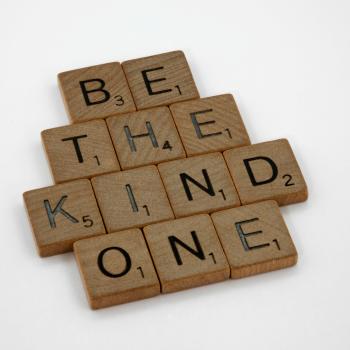Karen Armstrong is a former Catholic nun who left the church and became one of the world’s leading writers on spirituality and faith. She has penned books on the Bible, Buddhism, and Islam, as well as the ambitious A History of God. So when it comes to religion, she knows a thing or two.
In a 2018 interview on Oprah’s Super Soul Conversation, Oprah Winfrey asked Armstrong the following question:
“Is there a common thread that ties together all religions?”
After decades of religious study and writing, Armstrong stated there was one theme she found in all religions and that “if you got this one thing right, nothing else mattered.” That one thing is compassion.
Armstrong tells us that compassion can be summed up by The Golden Rule. It’s something all religions teach and contains some variation of this idea: Always treat others the same way you would like to be treated yourself.
- In the Bible, this is found in Matthew 7:12 : “Do unto others as you would have them do unto you.”
- In the Jewish Talmud, it reads: “That which is hateful to you, do not do to your fellow man.”
- In Buddhism, it is stated: “Hurt not others with that which pains yourself.”
- And in Islam, it is written: “Do unto all men as you would wish to have done unto you and reject for others what you would reject for yourself.”
“Compassion is something really worthwhile. It is not just a religious or spiritual subject. It is not a luxury, it is a necessity.” ~ The Dalai Lama
Armstrong advises us to follow the lead of Buddhism and have compassion for all living things. This starts by realizing that every person, no matter how fortunate or happy they may seem, has some level of pain within. By honestly looking into our own hearts, we can sense our own pain, and realize that this pain and suffering exists in others as well.
We all endure hardships. We must realize we are not alone.
The rest of humanity is on the same often difficult journey through life and deserves the same compassion we often only reserve for ourselves. I was reminded of this while reading a late-night tweet by the uber-successful Hamilton creator Lin-Manuel Miranda, showing that he too shares our struggles. He wrote:
Goodnight to all your mistakes and deleted tweets and frayed nerves and broken hearts and nervous tics. I am aching just like you and I am learning just like you.
That’s a universal truth: Life is one big learning experience, and we are all in it together. We need to treat and respect others like we want to be respected, without displays of petty meanness or copping attitudes for minor transgressions. We need to start living not just for ourselves, but for others.
We can do this by being involved and active in our own personal universe. We can offer others a haven of peace of which we are the center. Start looking around you, family and friends first. Is there someone you know who is distressed or needs a kind word? Do you see an opening for a heartfelt conversation?
Next, move outward to your workplace and community. As Armstrong says: “Try being a light to the people you meet every day.” This extends to offering warmth and what I’ll call “good vibes” to the strangers you see on the bus, walking down the street, or in line at the bank or a coffee shop.
Each person you encounter may be enduring their own personal tribulations. Smile at them. Silently wish them well. When appropriate, encourage them or offer a kind word. Do your part to make the world a better, more compassionate place.
Twelve Steps to a Compassionate Life
The following steps are from Karen Armstrong and are an edited version of a list that appeared at Oprah.com. For a complete explanation of each step, see Armstrong’s book titled Twelve Steps to a Compassionate Life. But this should be more than enough to get you started on living a more compassionate life.
Step 1. Learn about compassion. Know and internalize the Golden Rule.
Step 2. Look at your own world. Start with your immediate family. Who needs your attention?
Step 3. Show compassion to yourself. It’s the first step toward compassion for others.
Step 4. Be empathetic. Know the pain you feel is felt by those around you.
Step 5. Be mindful. Be fully present in each moment, for these moments are your life.
Step 6. Take action. Engage in small acts of kindness with friends and acquaintances.
Step 7. Realize how little you know. Be humble, not a know-all.
Step 8. Connect with others. Remember listening is as important as speaking.
Step 9. Show concern for everybody. This includes people of different races and cultures.
Step 10. Increase your knowledge. Never stop looking and learning.
Step 11. Recognize those in need. Identify the people who need your help.
Step 12. Love your enemies. Perhaps the hardest step of them all.
A version of this story appears in my book Wake Up Call: Daily Insights for the Spiritually Curious.














